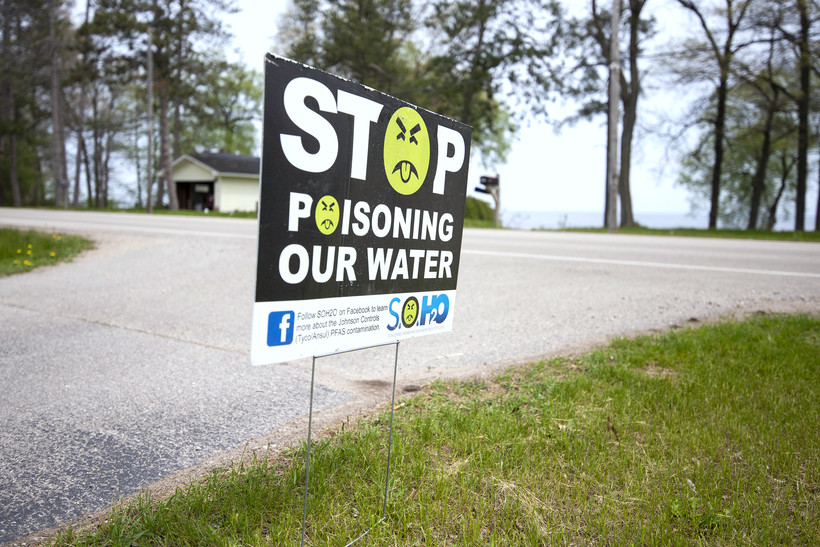Health Leaders Say Wisconsin Isnt Moving Fast Enough On PFAS
Get your daily scoop of Milwaukee's best stories.

A sign in Kayla Furton's yard on Thursday, May 20, 2021 in Marinette, Wisconsin. Angela Maggiore / WPR
Environmental leaders and health advocates in Wisconsin say the state is not acting fast enough to address PFAS contamination.
An online panel hosted by Wisconsin Health News this month focused on legislation passed by the state Senate that would provide assistance to local governments and landowners to address PFAS contamination. Gov. Tony Evers , a Democrat, said in October he would consider vetoing the law, which would have limited the Department of Natural Resources' ability to inspect and clean up chemicals on private property.
Republicans and industry groups say the changes are necessary to protect landowners who do not produce PFAS contamination but currently fall under the DNR's definition of a discharge source. But environmentalists say the change will make it easier for companies to avoid liability for pollution.
State Sen. Eric Wimberger , a Green Bay Republican, is one of the bill's sponsors and spoke on an online panel. Senate Republicans said they met with the governor shortly before the bill passed the Senate and believed bipartisan discussions would continue.
"This will probably go back and forth," Wimberger said during the debate.
The bill must be approved by the assembly before being presented to the governor. Wimberger also does not expect the House to try to change the law in January.
Get daily coverage of Milwaukee Stories.
I would be very concerned if there was a proposal to try to do that because there is a balance between what the environmental groups want and what the council wants, what the city wants and what the legislature will accept. - he says.
Society faces a "heavy burden" to deal with PFAS contamination.
Another spokeswoman for Wausau Mayor Kathy Rosenberg said her community has "qualified support" for the Republican-drafted bill, which calls the $125 million in funding for cities that provide PFAS protection "crucial."
Although Wausau has received some federal funding to pay for the city's new filtration system to remove PFAS, which was first detected in 2022, Rosenberg confirmed that the $17.5 million system is "hard work."
“The people of Wausau and Wisconsin don't care who is polluting. During the conversation, he said, "They only want to drink water." “We have some concerns about the sewage law and other provisions of this bill. (But) we are optimistic that we can do it with this bill. There is something for everyone in our country.
But Campbell Township Supervisor Lee Donahue , whose community has been using bottled water since 2021, rejected the idea that DNR officials are preventing landowners from testing their water because of PFAS contamination in private wells. When PFAS was first discovered in their area, residents were concerned about their health, he said, not that the source of the release would be named.
"It's a legal entity, but part of what we live with every day is trying to stop PFAS contamination at the source," Donahue said during the debate. “Otherwise, we can chase our tails over and over again. We rely on state legislators and federal officials to help us reach our goals.
PFAS, short for per- and polyfluoroalkyl substances, are thousands of synthetic chemicals used in cookware, food packaging, and firefighting foam. Chemicals do not break down easily in the environment. Studies show that exposure to high levels of PFAS is associated with kidney and testicular cancer, fertility problems, thyroid disease, and decreased response to vaccines over time.
Donahue said the pollution spread in Campbell over the past three years has affected residents' quality of life, preventing them from growing crops or eating locally caught fish. He said similar stories are happening in other communities in the state where PFAS has been found, such as Wausau and Peshtigo.
"They're seeing their tax rates go up, and in many communities, they're seeing the negative impact on health and related medical costs," he said. "Sometimes there are many effects that are difficult to measure, health effects, but the costs are paid by taxpayers. They are not transported by people who cause pollution."
Federal PFAS action has been slow.
Beth Neri, co-chair of the Wisconsin Environmental Health Network, said during the discussion that Wisconsin needs to take steps beyond PFAS cleanup to stop the flow of PFAS into the environment. Other states, including Minnesota, are taking steps to ban the use of chemicals deemed unnecessary, he said.
"Cosmetics, ski wax and other products should not be," says Neri. “The federal government needs time to do this. That is why countries are leading in this regard.
Neri also asked doctors to guide them on how to treat patients with high levels of PFAS, which are toxins that primarily affect children and fetuses.
Wimberger said he is open to the idea of a government ban on non-essential uses of PFAS, but said companies should be given enough time to make the transition.
Listen to the WPR report here
City health leaders say Wisconsin is not moving fast enough to end PFAS exposure . Originally published by Wisconsin Public Radio.






Tidak ada komentar untuk "Health Leaders Say Wisconsin Isnt Moving Fast Enough On PFAS"
Posting Komentar